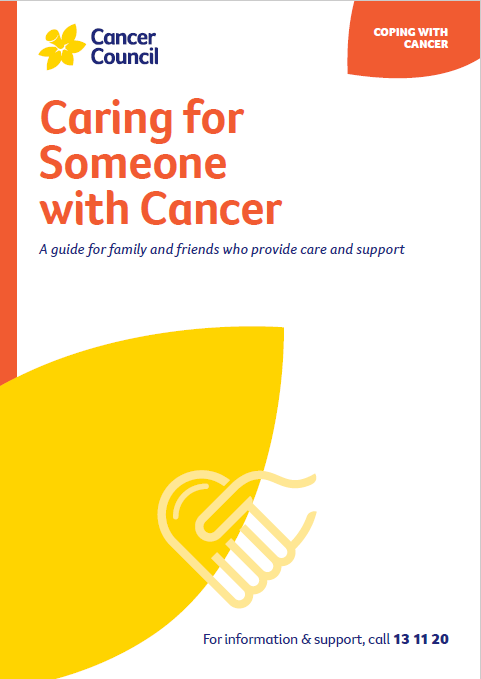- Home
- Cancer Information
- Coping with a diagnosis
- Emotions and cancer
- Caring for someone with cancer
Caring for someone with cancer
You may be reading this because you are caring for someone with cancer. What this means for you will vary depending on the situation. Being a carer can bring a sense of satisfaction, but it can also be challenging and stressful.
It is important to look after your own physical and emotional wellbeing. Give yourself some time out and share your concerns with somebody neutral such as a counsellor or your doctor, or try calling Cancer Council 13 11 20. There is a wide range of support available to help you with the practical and emotional aspects of your caring role.
Learn more about:
Support
Support services – Support services such as Meals on Wheels, home help or visiting nurses can help you in your caring role. You can find local services, as well as information and resources, through the Carer Gateway. Call 1800 422 737.
Support groups and programs – Many cancer support groups and cancer education programs are open to carers as well as to people with cancer. Support groups and programs offer the chance to share experiences and ways of coping.
Carers Associations – Carers Australia provides information and advocacy for carers.
Cancer Council – Call Cancer Council 13 11 20, to find out more about carers’ services. See more on Caring for someone with cancer, or listen to our podcasts How to Help Someone with Cancer and Cancer Affects the Carer Too.
Ways carers can help
There are many ways to show your concern or offer support to someone who has been diagnosed with cancer.
Offer to go with them to appointmentsYou can join in the discussion, take notes or simply listen.
|
|
Don’t be afraid to say nothingThe silence might feel awkward, but simply being close to the person or holding their hand also shows you care and provides comfort.
|
|
Try not to do too much or take overGive the person the opportunity to do things for themselves. This can help them maintain a sense of normality and independence. They may appreciate the chance to be useful and connected to activities they enjoy, such as reading to kids or doing online shopping, even if they can’t do as much physically.
|
|
Focus on other thingsMake time to watch your favourite sport or TV show together, play a game of cards or a board game, or go on an outing together.
|
|
Look after yourselfGive yourself time to rest, as well as time away from the person with cancer. They probably would also appreciate some time alone. Don’t underestimate the emotional impact of supporting someone through cancer – you need to look after your own health if you’re going to give support.
|
|
Provide practical helpYou could cook a meal, help with the house or garden, take the kids to school or offer to drive the person to appointments. But remember, the carer doesn’t have to do it all – accept offers of help from family and friends.
|
|
Become informedLearn about the cancer and its treatment. This will help you understand what the person is facing, but hold off on offering your opinion unless they ask you for it.
|
|
Talk honestly about your feelingsTry not to change the subject if a conversation gets uncomfortable. Instead, share how you feel and respect each other’s feelings.
|
|
Be aroundYour presence can help them feel less isolated and lets them know you care. If you are not there in person, check in by phone, text or email.
|
|
Listen to their concernsTry to understand the person’s feelings and their perspective about treatment, side effects, finances and the future.
|
More resources
A/Prof Anne Burke, Co-Director, Psychology and Allied Health Lead, Cancer, Central Adelaide Local Health Network and The University of Adelaide, SA; Hannah Chen, Psychologist, Cancer Council Queensland; Hazel Everett, Clinical Nurse Consultant, Cancer Services, St John of God Subiaco Hospital, WA; Shona Gates, Senior Social Worker, North West Cancer Centre, TAS; Dr Jemma Gilchrist, Senior Clinical Psychologist, Mind My Health and Crown Princess Mary Cancer Centre, Westmead, NSW; Sandra Hodge, Consumer; Dr Michael Murphy, Psychiatrist and Clinician Researcher, Prince of Wales Hospital, NSW; Caitriona Nienaber, 13 11 20 Consultant, Cancer Council WA; Dr Alesha Thai, Medical Oncologist, Peter MacCallum Cancer Centre, VIC; Alan White, Consumer.
View the Cancer Council NSW editorial policy.
View all publications or call 13 11 20 for free printed copies.
Need to talk?
Support services
Coping with cancer?
Speak to a health professional or to someone who has been there, or find a support group or forum
Need legal and financial assistance?
Pro bono services, financial and legal assistance, and no interest loans
Cancer information
How will you feel as a carer?
Learn about some of the emotions you may feel as a carer, and ways to manage your emotions to cope better in these challenging times
How relationships can change
Learn how your relationships can change after you or someone you know has been diagnosed with cancer, and how to manage this


